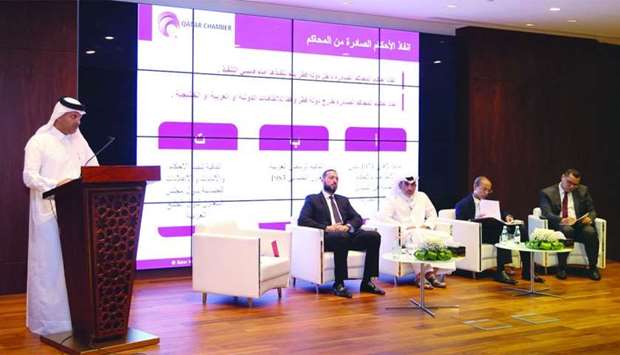The Ministry of Commerce and Industry (MoCI) organised on Thursday a seminar on investment prospects in the State of Qatar, in the light of Law No 1 of 2019, regulating the investment of non-Qatari capital in economic activity.
The seminar was organised with the aim of shedding light and introducing various aspects of this law as one of the most important laws regulating foreign investment, and also attracting foreign capital to achieve economic diversification in accordance with Qatar National Vision 2030, which facilitates the entry of foreign investors into the Qatari market.
The seminar was attended by a number of officials from the Ministry of Commerce and Industry, Qatar Financial Centre, Qatar Chamber, Qatar Investment Authority and Qatar Free Zone Authority, as well as a group of specialists, experts, judges, lawyers, academics and students at the Faculty of Law at Qatar University, and those involved in the trade and investment sector in various economic activities.
At the outset of the event, the Director of the Legal Affairs at the Ministry of Commerce and Industry Hilal Mohammed al-Khulaifi said that the seminar is held in line with the ministry's keenness to follow up the legislative renaissance in the country and raise awareness of the financial and business community on the latest developments in the investment environment, which will enhance the efforts aimed at achieving the vision of the State of Qatar 2030 and the aspirations of human, economic and social development.
Al-Khulaifi highlighted the advantages and incentives of investment granted by the current law to the non-Qatari investor, as well as the important package of legislation to improve the business climate in the country.
In this regard, al-Khulaifi cited the launch of the Investment Promotion Agency.
Al-Khulaifi added that the Qatari legislator is currently working on a new public-private partnership law to increase private sector opportunities in the sports, health and education sectors, in addition to a new bankruptcy law which is expected to be in place to preserve non-performing projects and give them the opportunity to restructure.
The second panel discussion tackled the most important features of the new investment law No (1) for the year 2019.
In the session, Dr Imad Nasr Oraibi from the MoCI presented some definitions of the concept of foreign money in terms of economic and legal aspect, as well as the most important classifications of investments, according to the legal nature of the investor, its geographical source, the ultimate purpose of the investment, with the possibility of overlapping these varieties.
The third panel discussed the international protection of foreign investments, Dr Zain al-Abdin Sharar from Qatar International Court reviewed the objectives of the foreign investment tribunals, namely to support the investment climate and find a successful mechanism for settling investor disputes in accordance with international best practices.
He pointed out that the State of Qatar attached importance to this matter, as the Qatari legislator recognised the importance of commercial courts specialised in supporting the investment climate, pointing out that the main objective of the establishment of the International Court of Qatar is to support the investment climate, as it includes a group of senior judges known internationally.
The fourth discussion panel dealt with the methods of resolving investment disputes, during which HE Sheikh Dr Thani bin Ali al-Thani, a member of the Board of Directors of Qatar International Centre for Conciliation and Arbitration (QICCA), said that the permanent constitution of the State of Qatar ensures the right of litigation, explaining the different ways in resolving investment disputes, where he addressed the legal aspect and the role of the judiciary in this regard, as well as the alternative means of resolving investment disputes, namely reconciliation, mediation, conciliation and arbitration.
His Excellency pointed to the international agreements and model international laws, referring in this regard to the State of Qatar's accession to the Washington Convention on the settlement of disputes arising from investments between States and nationals of other countries, adding that the Qicca derived its rules from the UNCITRAL Arbitration Rules.

